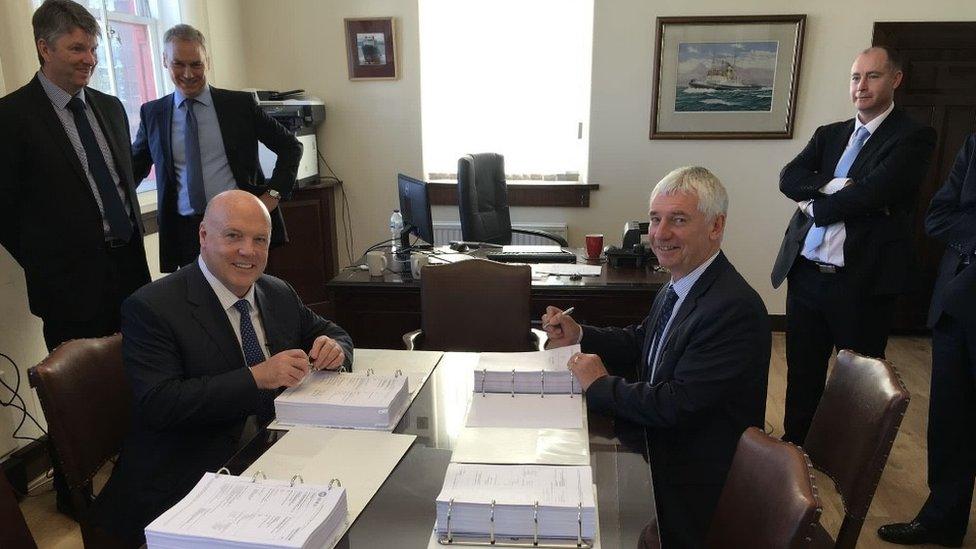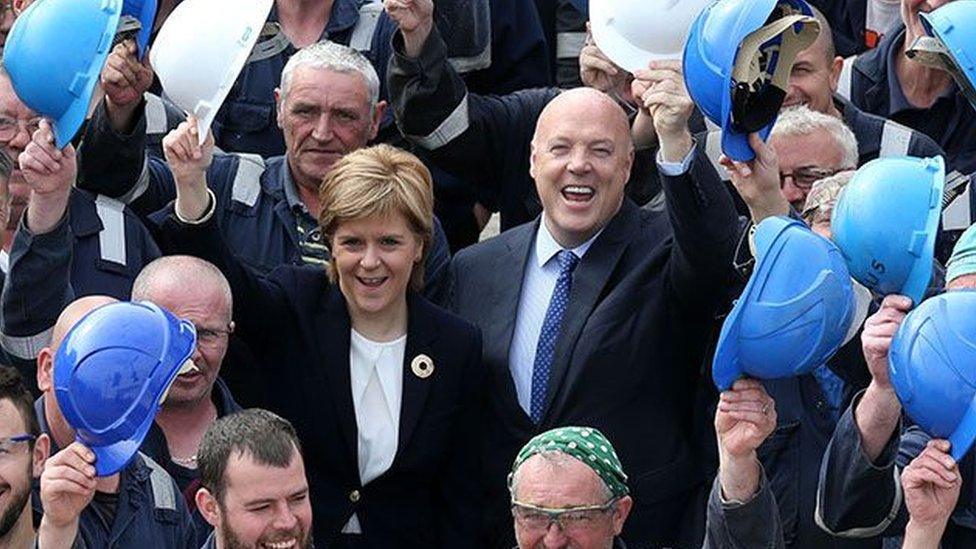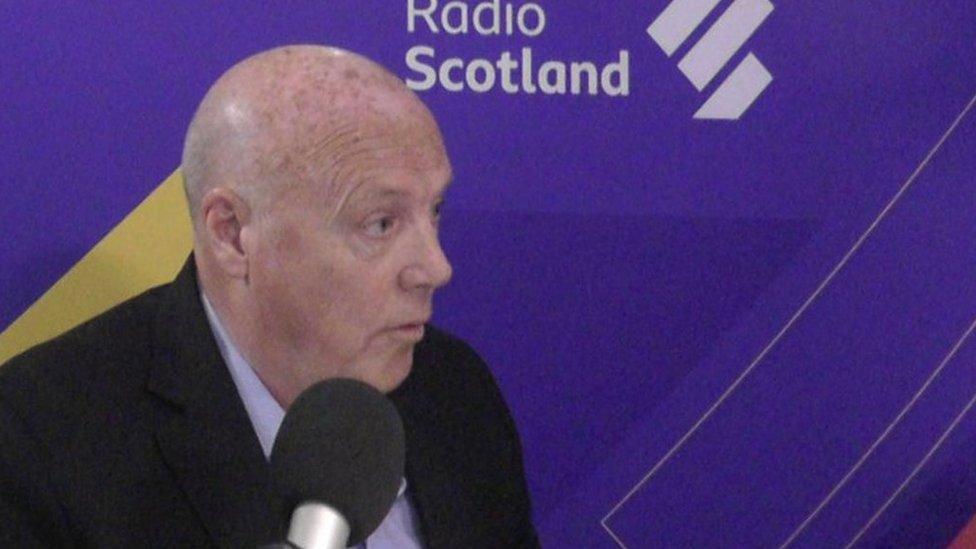Nicola Sturgeon accused of 'lie' over ferry contract
- Published
Jim McColl's claims are the latest in a war of words over the troubled ferries contract
The former Ferguson shipyard owner has accused Nicola Sturgeon of lying when she said it would have shut without the contract to build two CalMac ferries.
Jim McColl also disputed the first minister's claim that the contract had saved 400 jobs - because the yard had only employed 150 people at the time.
Mr McColl has previously claimed the contract to build Glen Sannox and Hull 802 was awarded for political reasons.
The ferries are now five years behind schedule and massively over budget.
Speaking to the BBC's Good Morning Scotland programme, Mr McColl was asked about comments made by the first minister on Monday when she said the yard would have closed and 400 people would not currently be employed at the yard if it had not been given the contract in 2015.
He said: "That is a lie. At the time there were 150 employees, not 400.
"I think she was a bit rattled in the interview and she mixed it up with the statement that they made about saving the yard."
When it was suggested to Mr McColl that calling the first minister's statement a lie was "very strong words", he said: "Well, it's not true".
He added: "The yard had outstanding work. It was still working on the ferry Catriona which wasn't launched until 2016 and was delivered early and on budget.
"It also had additional construction work, fabrication work, so there was no danger of the yard going under at that time."

Jim McColl and Tom Docherty from CMAL both signed the ferry building contract
Mr McColl also admitted he had made a mistake in a previous interview when he had claimed he had not signed the contract for the ferries.
Documents bearing his signature were subsequently produced which showed this was not the case.
Ms Sturgeon had told the same programme on Monday that the yard would "almost certainly have closed and the 400 people who are currently employed there, earning a wage, supporting their families, would not be in that employment".
The first minister also said that the government had sought to protect jobs and shipbuilding on the Clyde "at every point", but admitted that delays to the ferries and increased costs were "deeply regrettable".
She added: "Commercial shipbuilding exists on the Clyde because of the decisions the government has taken".

Nicola Sturgeon joined Jim McColl at the yard when she announced it was the preferred bidder for the CalMac ferries in August 2015
Responding to Mr McColl's comments, a spokesman for the first minister said she had been "clearly referring to the 400 people currently employed at the yard".
He added: "Those 400 jobs would not currently exist if the Scottish government had not taken the action we did to save the yard - that is a fact."
Ferguson's - the last commercial shipyard on the Clyde - went into administration in August 2014 but was saved when then-First Minister Alex Salmond personally intervened.
He persuaded Mr McColl - a billionaire businessman who was one of his economic advisers - to take over the yard just days before the Scottish independence referendum.
Nicola Sturgeon: "Commercial shipbuilding exists on the Clyde because of the decisions the government has taken."
Ferguson's was announced as preferred bidder to build the two new ferries for state-owned ferry network CalMac a year later - despite being the most expensive of the six yards that bid for the contract.
The signing of the £97m fixed-price contract was announced in October 2015 to applause on the opening day of the SNP conference in Aberdeen, with the first steel being cut a month later.
But it only took a few weeks for the timetable for building the ferries to slip as costs soared - and the yard was eventually taken over by the government after again going into administration in 2019.
The new boss of the yard, David Tydeman, said last week that the target was for both ferries to enter service next year - five years later than originally planned.
He also said it was his intention to deliver both ships at a total cost of £206m - more than double the original £97m price tag.
That figure is on top of a £45m loan previously given to the shipyard by the government.


Three questions have dominated the most recent chapter of the ferries saga. And just when you think you're getting answers, more keep coming.
The first was which minister was responsible for overriding the advice of the ferry procuring agency, CMAL?
We sort of know the answer to that. The documentation can't be found or never existed, but responsibility falls somewhere between former minister Derek Mackay, Keith Brown who is now justice secretary, and Nicola Sturgeon, with responsibility for all Scottish government decisions.
Second question: why was there no refund guarantee? Such contracts normally have one, called a Builders Refund Guarantee (BRG).
This is a promise of refund or compensation up to the value of the contract. It's usually a financial instrument, sometimes provided by a bank. And according to Mr McColl, it is often provided in other countries by a state investment bank. It is effectively a state subsidy to manufacturers.
So if a shipyard or another manufacturer fails to deliver the goods, there's money back and/or compensation to the buyer - in this case, the Scottish government, or its agency.
So here's what we now know, from Audit Scotland, the Scottish government and Jim McColl.
Having taken over Ferguson shipyard in 2014, the following August, the company was given preferred bidder status for the building of two large ferries. The tender had made clear that a BRG, as normal, be required from the successful bidder.
On 26 August 2015, as preferred bidder, Ferguson shipyard's management told CMAL it could not provide that funding. It is not so clear why this was not made clear at the bidding stage.
Audit Scotland tells us that CMAL then advised that the procurement process should be re-started. Ministers disagreed, but which minister and why? That's where the paper trail runs cold.
The next day, the shipyard was informed it was being confirmed as successful bidder, and four days later, Nicola Sturgeon went to the shipyard to announce it.
We're told by the Scottish government that "other mitigations" were put in place, allowing for the guarantee to be avoided.
One of these was a £25m bond with a finance company. Another was, according to Mr McColl on Radio Scotland, "a parent company guarantee".
The parent company of Ferguson Marine, from 2014 to 2019, was Clyde Blowers Capital (CBC), the company owned and controlled by Mr McColl.
According to Audit Scotland: "CMAL believed that Clyde Blowers Capital would have met the guarantee requirements on Ferguson Marine's (the shipyard's) behalf. CBC reported however that it did not consider any involvement in providing a guarantee for FMEL."
So here are new questions: when compensation was due for a contract which had gone badly wrong, where was "the parent company guarantee" mentioned by the chairman of the parent company? And if it was worth anything, why was it not called upon?
From Mr McColl's interview comes another tangent to this tale: could Ferguson shipyard have survived without this CMAL contract? The First Minister says 'no': the industrialist says she's "lying", and the contract was not necessary.
That's strong language. Where they can probably agree is that we'll never know who is right.
The third dominant question of recent weeks, since Audit Scotland reported on the ferries fiasco, is a more contemporary one, with lots of sub-questions: when are these ships going to be finished, for how much, and will they meet the specification for CMAL and for Cal-Mac ferries?
Travellers to and from Arran, Skye, Uist and Harris are particularly eager to find out.
Related topics
- Published3 May 2022

- Published3 May 2022
